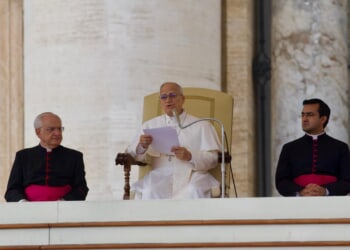There has never been a better time to be a college sports fan.
The expanded college football playoff system means more teams have a meaningful chance to compete for an NCAA championship — including teams from smaller-name schools. Instead of a single September loss meaning a team is out of contention, the entire season matters now.
Meanwhile, fans have more games to enjoy over the air.
Between August and December, from noon until midnight every Saturday, there is non-stop action. Compare that to when the broadcast schedule was more tightly regulated — and limited, for that reason.
Before the Supreme Court handed down its decision in NCAA V. Board of Regents of the University of Oklahoma in 1984, the NCAA would only allow one network to air college football games. Teams were also limited in the number of times they could appear on TV during a season, and some weeks would feature only one game. The court tossed out the NCAA’s control and allowed schools and conferences to expand what they offered to fans.
The lesson here is that the free market works. College football fans have more games to watch — and that’s good for everyone, fans and players (and schools) alike.
Especially the players, which is as it should be, since without them, there’d be nothing to watch.
It would protect the media rights of college teams while also protecting the rights of student athletes to their name, image, and likeness (NIL).
There is a bill under consideration in Congress that would serve the interests of both fans and student-athletes, called the Student Compensation and Opportunity through Rights and Endorsements (SCORE) Act. It would protect the media rights of college teams while also protecting the rights of student athletes to their name, image, and likeness (NIL). (RELATED: Figures Flip the Field)
The bill also protects the rights of colleges and universities and conferences to not have negotiating rights taken away from them.
The legislation addresses the chaotic manner in which the players are compensated. It would treat student athletes as independent talents — similar to the free agents in pro sports — instead of collectivizing their rights and forcing them to be employees of a college or university. They would become more like the professional athletes they effectively are (and many will go on to become).
But the compensation wouldn’t be just monetary.
The bill would require that student athletes also receive academic support, mental health services, post-participation health care, and help with degree completion, so as to promote academics as well as athletics. Agent fees would also be capped at 5 percent to prevent the exploitation of student athletes — some of whom are not yet legally adults.
The NCAA supposedly guarantees most of these policies already, but it hasn’t necessarily delivered.
Now it would have to do so.
Proponents of the legislation argue that a federal — that is, national — approach is necessary because otherwise there will be a patchwork of laws that would allow states to enact different laws that could give one state an advantage over another. For example, the state of Ohio has always put more of a premium on athletics at its universities than New York ever has. Predictably, Ohio State would trounce any SUNY school in the arena.
A federal policy would create a more level playing field.
Liberal lawmakers have put up their own alternative to the SCORE Act. They call it the SAFE Act — and if it becomes law, a government-mandated NCAA committee would be empowered to control the broadcast rights for all 136 Football Subdivision schools. That would turn back the clock to the time when college football fans had limited viewing options, and one game lost early in the season could end a season.
The SAFE Act would also ban schools and conferences from extending their current contracts — many of which were signed only recently — and all of which end at different dates with different broadcast networks. The act would make it federal law that such agreements may not be renegotiated or extended, regardless of whether there is a provision in the contract that authorizes an extension.
The people closest to this issue prefer the SCORE Act. For example, the commissioners of the 31 NCAA Division I conferences recently published an open letter on X to lawmakers, asking them to support it: “We believe we are on common ground not just among each other, but with members of both parties in Congress as well as the American public in our desire to have college sports return to a state of stability,” they wrote.
Athletes who want independence and colleges also want the free market approach to NIL issues, for all the obvious reasons. They’d rather be in more control of their name, image, and likeness — just like the pros.
The SCORE Act is the right play because it will protect the rights of the student athletes using effective free market principles that serve the interests of players as individuals, as well as the interests of fans, who enjoy watching a good game.
READ MORE from Eric Peters:







![Florida Officer Shot Twice in the Face During Service Call; Suspect Killed [WATCH]](https://www.right2024.com/wp-content/uploads/2025/12/Inmate-Escapes-Atlanta-Hospital-After-Suicide-Attempt-Steals-SUV-Handgun-350x250.jpg)








